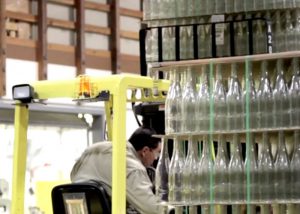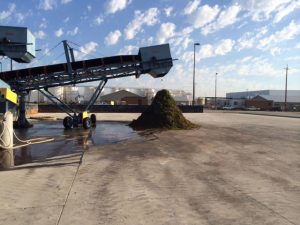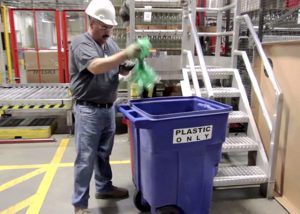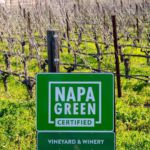Menu

Lighter glass bottles are just one component of Trinchero Family Estates’ plan to reduce resource use.

Pomace and other green waste is collected for compost.

Employees are trained on how to properly sort waste to improve waste diversion rates.
A History of Waste Reduction at Trinchero Family Estates
Trinchero Family Estates was recently awarded the premier California Sustainable Winegrowing Leadership Award Green Medal for their company-wide business leadership, recognizing a history of smart resource use going back nearly 70 years. When the Trinchero family purchased the Sutter Home winery in 1948 they began a tradition of recycling that included purchasing, washing and reusing bottles from neighboring wineries. Kevin LeMasters, VP of operations, says, “It was their way of recycling without even thinking about it.” Among its many sustainability innovations, the company’s waste reduction and diversion efforts have been particularly notable. They have achieved 80-90% diversion across their facilities in St. Helena and Lodi.
Trinchero Family Estates has made waste reduction a part of the company-wide DNA, recycling more than 2,000 tons of material – including glass, plastic and paper – each year. Imagine nearly 900 Teslas getting carried to the landfill – that’s the equivalent weight in materials that Trinchero diverts annually. They carefully track waste and diversion at each facility and even hired a solid waste sustainability coordinator to help them zero in on zero waste. LeMasters notes, “Landfills are not an asset – they are a waste of good land.”
A critical aspect of Trinchero’s success is communicating with suppliers about their sustainability commitments and ensuring they will take back and reuse pallets, drums, shipping boxes and packaging. They’ve also identified vendors who recycle industry-specific waste like corks, capsules and containers.
Trinchero Family Estates has made waste reduction a part of the company-wide DNA, recycling more than 2,000 tons of material – including glass, plastic and paper – each year. Imagine nearly 900 Teslas getting carried to the landfill – that’s the equivalent weight in materials that Trinchero diverts annually. They carefully track waste and diversion at each facility and even hired a solid waste sustainability coordinator to help them zero in on zero waste. LeMasters notes, “Landfills are not an asset – they are a waste of good land.”
A critical aspect of Trinchero’s success is communicating with suppliers about their sustainability commitments and ensuring they will take back and reuse pallets, drums, shipping boxes and packaging. They’ve also identified vendors who recycle industry-specific waste like corks, capsules and containers.
Landfills are not an asset - they are a waste of good land.
- Kevin LeMasters, Trinchero Family Estates
Packaging Innovations
Trinchero Family Estates is a pioneer in transitioning to lighter weight wine bottles. Using lightweight glass has a ripple effect: it takes less material and energy to produce; there’s less weight to ship; and it reduces the company’s carbon footprint. In the first year alone, Trinchero saved 50,000 barrels of oil by transitioning to lightweight glass! Lightweight bottles also save money on production and transport.
Trinchero has also been a leader in experimenting with other packaging innovations, including 100% recyclable PET bottles, Tetra Pak® made primarily from paper and plant-based capsules. Using PET bottles for Sutter Home 150ml containers cuts energy use and the GHG footprint by more than half compared to glass. Tetra Pak® uses 92% less packaging, 54% less energy and creates 80% less GHGs compared to glass. The shape also allows for more efficient packing and shipping, requiring 35-40% fewer trucks to deliver the same amount of wine. Plant-based capsules made from EarthFirst® PLA Film are certified compostable and the aluminum disk on the bottle is recyclable.
Vineyard Practices
Trinchero’s waste reduction doesn’t end in the winery, but extends into the vineyard. They minimize the use of synthetic chemicals for pest and weed control by using cover crops, Integrated Pest Management, bird boxes and more. Each year they compost more than 20,000 tons of grape skins, seeds, and stems. “Once you create behavioral change, no matter the size of your company… you do it every day and it’s done,” said LeMasters.
These far-reaching efforts to reduce waste explain why Trinchero Family Estates was the only Northern California winery to receive the Waste Reduction Awards Program (WRAP) Award every year from 2001 to 2011, and why recognition for their leadership keeps rolling in.
Do you want to reduce your waste? Ted Wells, environmental compliance and engineering manager for Trinchero Family Estates, recommends:
1
Understand and inventory the amount and types of by-product you generated during each step of your production process. Start with inputs/supplies and end with the outputs/product.
2
Work with your suppliers to minimize packaging and waste from purchased materials. Ask suppliers to own and take back containers.
3
Can waste in one area can be an asset in another, like pomace and Diatomaceous Earth.
4
Evaluate the packaging of your finished product. Can you minimize weight and maximize recycled content? Trinchero reduces waste while still meeting the highest quality standards.
Making the commitment to third party certification takes time and effort, but it is worth it to demonstrate our commitment to the community and to protect our watershed, our land and the air we breathe.
- Susan Boswell, Chateau Boswell Winery


